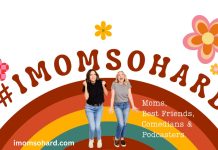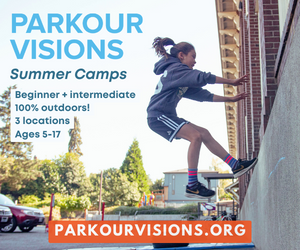Portland Mom Collective is committed to sharing resources and information with Portland families. In our Q + A Sessions series, we talk to experts in their fields about common topics relevant to our readers.
In this session, we discuss postpartum health and wellness with Dr. Angela Potter, a nutrionist and naturopath practicing out of her clinic in Northeast Portland. By answering reader questions, she helps us navigate some of the more common concerns postpartum moms encounter and steps moms can take towards feeling nourished, replenished, and healthy. (PS Postpartum recovery goes waaaaaayyy beyond the six-week check-up!).
Dr. Potter is a leading holistic doctor supporting mothers in their healing process after birth. After the birth of her first baby she came face-to-face with the hardships mothers frequently experience after giving birth. From there she developed her Postpartum Wellness Protocol that she uses with mothers nationally.
Dr. Potter has been interviewed for Healthline.com for postpartum-specific articles. She is a nutritionist as well as a doctor. Her office is located in Portland, Oregon where she lives with her husband and two toddlers. Find out more at www.drangelapotter.com and schedule your free breakthrough session here.
Portland Mom Collective
Welcome Dr. Angela Potter. I am so excited that you were able to join us today, thank you for coming on to have a chat. Many of you know that we opened up our social media channels to gather some questions about what the women that you serve might be dealing with. So, first, I’d like to ask you: what is your specialty and what do you do? I know you work with postpartum women and women in general, share with us a little bit about who you are and what you do.
Dr. Potter
Hi Lee Ann, thank you so much for having me here. I am Dr. Potter, I work with busy burnt-out moms to help them reclaim their health and energy. I really became passionate with supporting moms back when I gave birth to my first baby. I remember this time, three months post partum, I was back at work, and I’d had a really difficult time after his birth with just my own body. I was blown away by how difficult it was to heal. I had huge amounts of anxiety. I was in lots of pain.
There I was, trying to go back to work. And I thought, “Whoa, I can’t even begin to figure out how to compartmentalize.” My body was feeling so terrible, and then I was expected to put all of this time and work into… my work!
And I had this little baby who needed me for all his needs. It made me so sad and confused at the time because I was thinking, I am a mother. I recently went through this birth. And yet, I don’t have the health support that I need. Why is nobody telling me that this would be difficult that these were the steps and support that I need.
And I knew, also, that it was not the way it was meant to be, and there had to be answers out there.
So I just worked really hard. I got my own wellness team. I used my own knowledge. Medical knowledge, herbal knowledge, all the things. And I got to a place where I felt really strong and healthy, and that’s when I got pregnant with my second, my daughter. And then going through her pregnancy and birth, I did it totally different. I set up this whole postpartum healing plan. And I felt incredibly different. It was like a 190 degree turn. It was the exact opposite. I felt strong in my body. I didn’t have the anxiety that I had after my first. I felt grounded and just able to go through the ups and downs more easily.
Since then, I have been working with mothers who were feeling like I was. Stressed out, anxious, just not knowing he direction to take for their own health and to get to this place where they can feel strong and healthy and empowered and able to just wake up and say, “Alright, this is a fun adventure, what we going to do today?”
Portland Mom Collective
So you’re a naturopath working in a clinic in Portland, your own clinic. We’ve talked about this a little bit before, so you work, with, like you said, with this post partum phase, but what does that mean? I mean, what I like to say is actually what you first said, which is that postpartum is the rest of your life.
Dr. Potter
Yes! I do not put a timeline on postpartum. And that is a huge disservice that the medical community is giving to moms right now. Because, we define postpartum as the first six weeks. After birth, women go in for that six-week visit and they’re given that checkoff and they’re like, “Alright, you look fine, good luck.” And then, as the mothers, we think, “Ok, well, I got that checkoff at the appointment, I should feel fine, this should feel easy.” And, for so many, it’s not. So, mothers come in to my office three years postpartum, eleven years postpartum. They’re saying, I haven’t gotten any support from birth and I am still feeling the anxiety. I am still feeling run-down, burnt-out, exhausted. What can we do? And so, there’s no timeline on it. It’s just about, ok, how can we get you to a place where you are replenished, nourished as you need to be in this very unique time in your life. Creating babies and then healing your body and moving forward from that.
Portland Mom Collective
Yeah, and I think that really comes to the fore in a lot of the questions we received, so are you ready to jump into a couple of them?
Dr Potter
Yes, let’s do it.
Portland Mom Collective
Ok, so I really love this one because I think it resonates with a lot of people. I am just going to read it basically verbatim. She says, “I am one year postpartum with my second child. I don’t even know where to start with personal health. When should I stop taking prenatals? I am still breastfeeding. Everything is more intense. Slower weight loss this time. Less time to exercise, no self-care time. Plus, I’m dried out. Hair, eyes, skin (and brain?). What are the first steps when you have so little time for yourself, and how do you diagnose or know what areas you even need to treat?
Dr. Potter
Yes, this such a good question. Because, I want you to know, for you specifically who are asking the question, you are not alone. This is THE ISSUE. Mothers are just told to deal with it and oh you’ll be fine, it’s the price of motherhood, and that is not fair to you. Because there are so many options out there, and I get it. Particularly having more than one kid, you get feeling overwhelmed all the time, and unable to have as much time to take care of yourself.
So, let’s cover.. yeah.. where do we begin!!??
Portland Mom Collective
You’re feeling like she was when she was asking the question!
Dr. Potter
Yes, yes (laughing). One year post partum, you’re feeling dried out. You first want to focus on nourishing the body and replenishing lost nutrients. That, I think, foundation is most important because when we’re pregnant and, particularly when you are pregnant with your first baby, the nutrients are just funneling into your baby’s growth. Because, in our general medical community, we don’t have support for postpartum nourishment. You can walk into a bookstore and find so many books on prenatal nutrition and pregnancy nutrition. But, there’s just a handful for postpartum. And yet your body is going through so much to replenish the nutrients that were funneled to your baby during pregnancy, let alone that intense birth experience. Whether or not you had a vaginal birth or a c-section birth, your body lost a lot of nutrients during that process. And, so then, working on replenishing your body.
And, again, because we don’t have the specific postpartum nutrition information out there that is part of every postnatal appointment, most of us are just going back to general nutrition advice that we were doing pre-pregnancy. You know, wanting to get back to your pre-pregnancy weight, and taking about maybe reducing calories or eating in kind of a restrictive way, those things are actually causing more stress on your body, and so here you are, a year postpartum, having not gotten replenished from the birthing process, probably being pretty stressed out in this last year, and not eating the right nutrients that your body needs, and so focusing on that.
Number one is getting nutrients through food. Of course, I highly recommend to work with a practitioner who is going to help you find the deficiencies that your body has. I’m doing this all the time in my office, running vitamin labs to see what vitamin deficiencies you have. Vitamin D, B12, looking to see if there is any anemia happening. Particularly for those dried out feelings, that’s going to be a fatty acid deficiency, which is really important for after birth.
I am so glad you were like, “Brain, too?” Because that is intertwined. There was a study that showed that fatty acids were decreased by as much as 50% after the first pregnancy, and fatty acids are so important for our brain function, as well as skin and hair and then they weren’t replenished by 26 weeks postpartum. That was after the first pregnancy. Think about a second or third pregnancy, if you’re not replenishing those nutrients you’re just going to continually be depleted.
Lee Ann and I were just talking about this before we were recording, particularly in this last year, there’s so much going on. It’s like, I’m exhausted, I’m stressed-out, I’m scatterbrained, I’m having all these different things going on, but where do I even begin? And honestly, the best thing you can do for yourself is to reach out to a practitioner who has that birds-eye view of what’s going on. to help direct you. To look at what deficiencies you might be going through specifically, and then also to guide you. To say, Look you have all these things going on because you’re so busy and stressed out, but this is going to give you the best results, right now. And to give you the best stepping forward point for you to get to your first goal, and then start chipping away at the others, as well.
Portland Mom Collective
Yeah, I think having someone else’s perspective so that you’re not sitting there, swimming in it all, just wondering what to do, but someone else who is outside of you who can really lay it out for you is pretty much critical at this point.
Ok, and that actually segues nicely into our next question. We were talking about the brain piece, again I am going to basically read it. She said, “I have felt so much foggier mentally since having my second child.”
I know I can relate to that. “And he’s even sleeping through the night. Still feeling foggy. Would Dr. Potter recommend any supplements or are there any hormones or nutrients that are commonly depleted that we could try to bring up to speed to address that?”
Dr. Potter
Again, these are such juicy questions! There is so much there. (Laughs)
Ok, so. And, by the way, as I have worked with all my patients, I have developed this postpartum wellness protocol to help moms, it’s like a step-by-step plan to basically do all of this to get you to a place where you’re feeling really happy and supported in motherhood. It’s all these things.
Could you just read that last portion of the question again?
Portland Mom Collective
She said, “Would Dr. Potter recommend any supplements or are there any hormones or nutrients that are commonly depleted that we could try to bring up to speed?’
Dr. Potter
So, I was just talking a lot about the fatty acids, and that’s going to be important for this as well, for that brain fog, particularly. But I am so happy you brought up that hormone question because hormones are pivotal during this time. You know, pregnancy and postpartum are such hormonally-charged times, and what’s happening again, because we only have that six-week postpartum visit, then women aren’t going in to get tested after that to see what their hormones are doing. It’s estimated that between 5 and 10% of mothers get postpartum thyroiditis, which means an inflammation of the thyroid, within the first year postpartum. And for those who are struggling with hypothyroidism, low-functioning thyroid, which leads to weight gain and fatigue and poor sleep, 25% continue forward with that hypothyroidism that you got in the first year postpartum. So looking at thyroid and your hormones.
But, let’s take another step back, and say that the beginning of the hormone cascade is stress. We have a stress hormone: cortisol. Which is so important to look at. It’s a very simple test. It’s an at-home, salivary test to look at what your cortisol stress hormone is doing throughout the day. Because that hormone interacts — all of our hormones talk to each other — but because we have so much stress going on in our lives, particularly right now because of the pandemic but also because of being mothers trying to balance all the things and work and getting the kids out the door and all of it — that then interrupts our lovely normal cortisol pattern throughout the day. Because we’re constantly exposed to stress, then, that’s interrupting all of our other hormones. It’s spiking blood sugar levels, causing weight gain, it’s interacting with thyroid, causing mood swings, and fatigue, and thyroid plays a big part in our metabolism and weight. It’s interrupting our reproductive hormones like progesterone and estrogen so if you’re at a point where you have gotten your period back, you might be having irregular periods or you’re extremely cranky, having PMS or cramps. All of those things are cascaded from this stress, so that, I would say is one fo the most important things to get looked at is your stress hormone and how that’s playing into the rest of your hormonal pictures.
Of course, you can get tests to see what your other hormones are doing and that’s really important too. But, just a reminder that looking at that stress hormone and then working on some great foundational stress management techniques — not just techniques because that sounds like a self-help and mindfulness thing — which is really cool and important — but there’s nutrition advice, there are natural supplements that are helping your body adapt to the stress around you. It’s not that you have to change what’s going on, because as a mother you can’t. You’re just busy all the time. So you really have to help your body, physiologically shifting how your body adapts to the stress so then the same things are happening, the same chaos is running around your house and you’re doing all the things, and yet you can handle it much more easier.
Portland Mom Collective
So you mentioned that the cortisol test is a salivary test which sounds very straightforward, but other hormones are tested pretty easily. Is it usually a blood draw?
Dr. Potter
Yeah, blood draws you can do, or you can also do them salivary. I also work with labs that will do blood spot. I know some people, you know, it’s really great we have the vaccine out and people are starting to open up, but there are some people who are still hesitant to go to a hospital and get a blood draw, so you can get a kit sent to your house to either do a salivary test or a blood prick on your finger which is super simple.
Portland Mom Collective
So options are open for people; ok, I didn’t know a lot of that so that’s really cool Let’s move on to another question. So, I guess it’s actually related. So, somebody wrote in and said could you share more with us about bonding hormones, and how that impacts relationships even outside of the mother-child relationship? So, still in the hormone topic but a little bit on a different side of it.
Dr. Potter
Yes, yeah! That’s a great question. So you know, oxytocin is our nice bonding hormone. It makes us feel that very lovely veil of warmth and loveliness, and we get that through a lot of that skin-to-skin contact with baby. For some women, breastfeeding, but not always, but just holding your baby is really good for that.
I love this question that you are asking about other relationships, I’d love to know more about specifically what you are asking, but I’ll just take this and go with it as far as, you know, a spouse relationship. Because, that is so important to focus on during this time. Because, when a new baby comes into the house, regardless if it’s the first baby or the third baby, it’s a different relationship between everyone in the household. And so, really working on that relationship between you and your spouse is really important. So that skin-to-skin can be really lovely, so bringing your partner into that with baby can be really wonderful as far as boosting the bonding hormones, but also having some very real conversations with your spouse about kind of getting the lay of the land of how things are right now in your relationship and then anticipating what changes are coming up and how you two can support each other, and just getting to this place where communication is at the forefront, because that is so important when you are trying to figure out taking care of this young child but then also keeping the relationship between you and your spouse really strong.
Portland Mom Collective
Does oxytocin happen outside of the mother-child relationship, do we get it from other places?
Dr. Potter
Mm-hmm, yep. Just enjoying a beautiful view, or kissing, it’s just that feeling of euphoria. So yes, you can get the hormone increase outside of just that mother-baby relationship.
Portland Mom Collective
I think a lot of us know it as mostly that mother-child capacity, maybe because it’s more amplified of a response, I don’t know, but I had always thought there were obviously other sources, as well.
Ok, let’s move on to something that I think all parents can relate to, which is: sleep. We know that people can’t function without sleep, mothers included. But, often mothers assume that it just comes with the territory of being a mom to an infant. So, the question was, “What are Dr. Potter’s suggestions for making sleep a priority without compromising baby care?”
Dr. Potter
Yes, such a good question because sleep is pivotal to our health, but it is so up and down depending on how old the baby is. Even toddlers are sometimes not sleeping through the night. So it’s not just in those first few months postpartum.
So I am going to talk about it a couple different ways. One is, remembering that your health is just as important as baby’s health. And, it’s so easy, for us as mothers, our goal is to make sure that this baby thrives. Innately, that’s what we are doing. So it’s so easy to put our own needs on the back burner. You take that, and then add in as a culture, how we put aside the mother’s needs – we don’t offer the support and guidance that she needs to feel really strong and healthy. That’s why we’re here talking, because so many of us mothers are just feeling depleted. And, it’s not intertwined in our medical system to provide that support. So you take those two things together and it’s just so easy to think, “I can’t be doing these things for my own health because I just need to be focusing on the baby.”
So first off, remembering that the little things you are doing to help your baby sleep longer stretches at a time, getting them to sleep through the night, that is getting you to a place where you are feeling healthy too and sleeping so you can feel more balanced during the day and feel more energy. So that in and of itself, to be able to give your energy and just feeling good to your baby during the day, that is huge.
So remembering that, when you are supporting your baby to sleep longer stretches and through the night.
There are ways to help baby sleep that aren’t the cry-it-out method, so I want to remind people of that, too.
And, I want to say, sometimes, baby or kids are sleeping through the night or sleeping in a really great rhythm that, if mom were able to sleep as baby were sleeping, that would be great, and she would feel really good. But, you know, when mom goes to bed and her mind is racing and can’t fall asleep, or when baby wakes up in the middle of the night and then mom can’t fall back asleep and is up for an hour or two. Those are big issues and those happen a lot. And, typically, things like blood sugar and our stress hormone cortisol are interrupting with our sleep, not letting us go to sleep or keeping us awake in the middle of the night. If that is the picture, there are some really simple things you can do to support your nervous system so you can sleep better throughout the night.
Did that answer the question?
Portland Mom Collective
Yeah, and our last question was actually a sleep-related question as well but connecting to alertness during the day. How do you stay alert, healthily, if you’re also feeling sleep deprived. Or, if you’re using a sleep aid, then it kinda carries over into the next day, what are some options people have for not only getting the good sleep but also maintaining alertness during the day?
Dr. Potter
First off, from my perspective, a sleep aid would be almost last-resort. Because it’s more about looking at our stress hormone cortisol, what that is doing throughout the day, and working on diet changes during the day. I’m not saying that las in big changes, sometimes for moms, it’s more about “How do I eat three meals per day?” It’s more about how is that interacting with your alertness during the day and how can we make some really simple shifts to help that improve your energy. So some nutrition changes, simple nutrition changes, and looking at the stress hormone cortisol. You know, yeah, it’s just that stress picture. When we are talking about alertness, it’s really, how can we reduce our stress during the day, how can we reduce our body’s response to the stress going on and how can we support the nervous system so that we are able to go through the day much more easily, feeling more grounded and balanced. So that’s the trick, and doing that, even when you are in that space of, OK, I am up multiple times per night or I still don’t have this regular sleep rhythm with baby. It’s more about that and looking at it like, Ok let’s get your body feeling like it can react to the stressor of not sleeping well, and how can we do that to help increase your energy and improve your mood.
Portland Mom Collective
Yeah, I think so many of us just rely on coffee. I love coffee, don’t get me wrong, but it definitely has this big yo-yo effect where you’re kind of functioning and then all the sudden you drop, so that doesn’t… you’re talking about maintainning a nice consistent level and that’s not what happens with a lot of coffee.
Dr. Potter
Yes, I will say, it’s not my thing to take coffee away from people but coffee will —
Portland Mom Collective
Yeah, that would cause riots.
Dr. Potter
Yeah, but we talk about how it can cause huge blood sugar shifts and it can also be a big trigger for anxiety. So, how to drink the coffee to avoid it causing the anxiety and those blood sugar swings. And then also, how can we support the body to feel less stressed as well.
Portland Mom Collective
Yeah, absolutely. Those are the questions that we had, that we wanted to cover today. Id love to have you back on another time and people can submit more questions and we can keep the conversation open. Is there anything you want to say to listeners that’s coming to mind right now? I know we’re navigating some pretty crazy times.
Dr. Potter
Yes, absolutely, I just want you to know when you are watching this and you are feeling exhausted and stressed out and your moods are all over the place that one, you are not alone and two, there are resources available for you. So, if you haven’t yet found a practitioner who is dedicated to helping you find the root cause in how you’re feeling, and then getting you to this place where you are feeling strong and healthy, then I invite you to reach out to me. I am more than happy to jump on the phone with you for a free consult to learn about you and your health goals and to see what the options are to get you to that place where you’re healthy. You can head over to my website at drangelapotter.com and I look forward to talking with you.
Portland Mom Collective
Awesome, well thank you so much for coming in to chat today.
Dr. Potter
Thank you so much Lee Ann, this was wonderful.


















